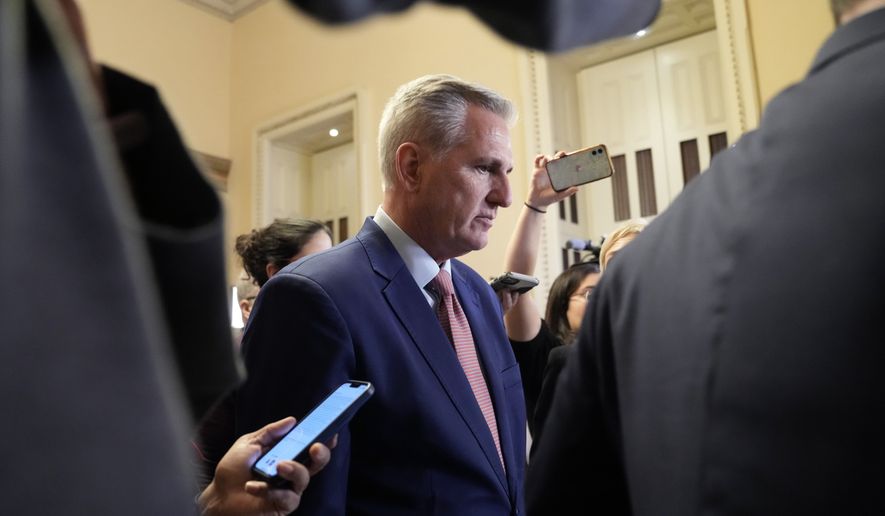House Republicans made history Tuesday, but not in the way they had hoped.
Instead of seizing the House majority with a historic number of new Republican lawmakers, the party’s minuscule advantage after the midterm elections gave a group of conservatives leverage to thwart Majority Leader Kevin McCarthy’s bid for speaker. The impasse left the party in disarray and the chamber in opening-day limbo for the first time in a century.
The House abruptly adjourned after three ballots cast by voice vote over five hours failed to elect either Mr. McCarthy or any other lawmaker to serve as House speaker.
Mr. McCarthy, of California, retreated to one of the speaker’s offices across from the House chamber. He was strategizing there with fellow Republicans before the House reconvenes at noon Wednesday.
Conservative holdouts say Mr. McCarthy will have to start seriously negotiating with them if he has any hope of eventually garnering the 218 votes he needs to win the speaker’s gavel.
They are demanding changes to House rules that would make it easier to eject a speaker, and they want promises for a chance to vote on a Republican agenda that includes term limits for members of Congress, a balanced budget act, a bill to end income taxes and replace them with a sales tax, and legislation advancing their favored strategy to secure the southern border. The lawmakers also want a rules change to ensure a minimum of 72 hours is provided to review legislation ahead of a vote, and they seek an end to rushed consideration of massive government spending bills that have contributed to inflation and a soaring debt and deficit.
“This is not about Kevin McCarthy,” a top aide to one of the holdouts told The Washington Times. “I know it seems that way, but it’s not. It’s about doing what’s right for the republic, saving the republic. That is where these principled members are.”
Mr. McCarthy showed little interest in negotiating, even after losing the second round of votes.
He told reporters in the Capitol that the threats from his Republican opponents wouldn’t persuade him to cave into their demands or force him to step aside.
“That’s not how it works,” Mr. McCarthy said. “You’ve got to put the people before politics, and I don’t think that’s what their constituents elected them to do.”
He blamed the disarray on the group of conservative rebels, who he said are “trying to fight for their own personal items instead of trying to fight for the country” and are taking advantage of the party’s tiny majority to exert leverage on the speaker’s race.
The inconclusive speaker’s vote left the chamber in a rare moratorium, halting the opening day organizing required to start the legislative session.
With no speaker or subsequent organizing, the chamber operates under the authority of the House clerk from the preceding Congress, Cheryl L. Johnson, who was appointed last year by Speaker Nancy Pelosi, California Democrat.
Ms. Johnson will preside over the chamber until a speaker is elected, and lawmakers are unsure when that will happen.
Mr. McCarthy defended his leadership and the Republicans’ advance to the majority. He said Republicans will fight for border security, fiscal responsibility and parental rights in education once they get past the speaker’s fight.
Mr. McCarthy has support from most of the Republican conference, and dozens have pledged to back him for speaker and no one else, no matter how many ballots it takes.
Conservatives who oppose him also have been steadfast. Some say they won’t give up until Mr. McCarthy drops his bid for the gavel.
“It’s going to become increasingly clear he’s not going to become speaker,” Rep. Bob Good, a Virginia Republican and McCarthy opponent, told reporters at the Capitol. “We will never cave. We will never vote for him. So the sooner he pulls out, for the good of the country, for the good of the Congress, the better off everyone is and we can move together to find the best person who can reach 218.”
Conservative holdouts don’t have anyone in mind to replace Mr. McCarthy, although several have suggested in interviews substituting Majority Whip Steve Scalise, a longtime Republican leader from Louisiana. Mr. Scalise is likely the only other Republican who could win the position, but Mr. Scalise backs Mr. McCarthy and nominated him on the third ballot.
The conservative rebels threw out their own symbolic picks even though it was clear neither could win. They nominated Rep. Andy Biggs, Arizona Republican and leader of the rebellion, on the first ballot. He picked up nine votes. They nominated Rep. Jim Jordan, an Ohio Republican and McCarthy backer, on the second and third ballots. He received 19 and 20 votes, respectively.
The divided Republican vote meant that on all three ballots, while no lawmaker won a majority, Mr. McCarthy garnered fewer votes than Rep. Hakeem Jeffries of New York, the Democratic leader who won a vote for speaker from every lawmaker in his party.
Some House Democrats watched the Republican chaos with glee and provided running commentary on social media.
Longtime Rep. Bill Pascrell, New Jersey Democrat, posted gifs of dumpster fires, a clown car, and the flaming Hindenburg. Rep. Hank Johnson of Georgia said the “never-ending vote” for speaker shows the Republican Party “already in chaos, confusion & crisis” while House Democrats, just five votes away from the majority, “are united. We are ready to get to work.”
• Susan Ferrechio can be reached at sferrechio@washingtontimes.com.
• Kerry Picket can be reached at kpicket@washingtontimes.com.
• Mica Soellner can be reached at msoellner@washingtontimes.com.




Please read our comment policy before commenting.